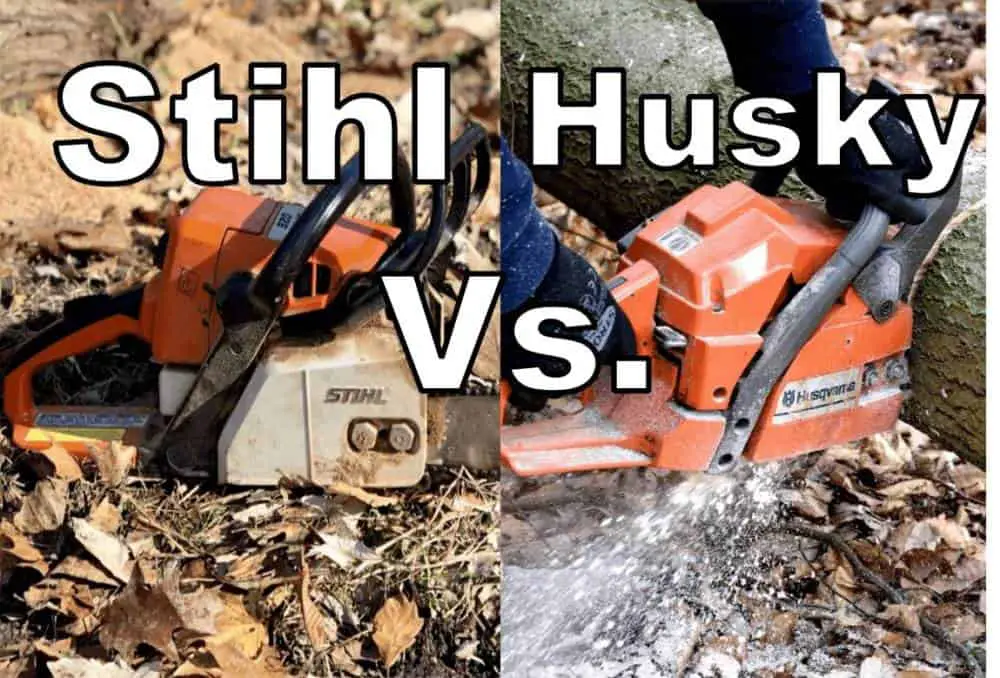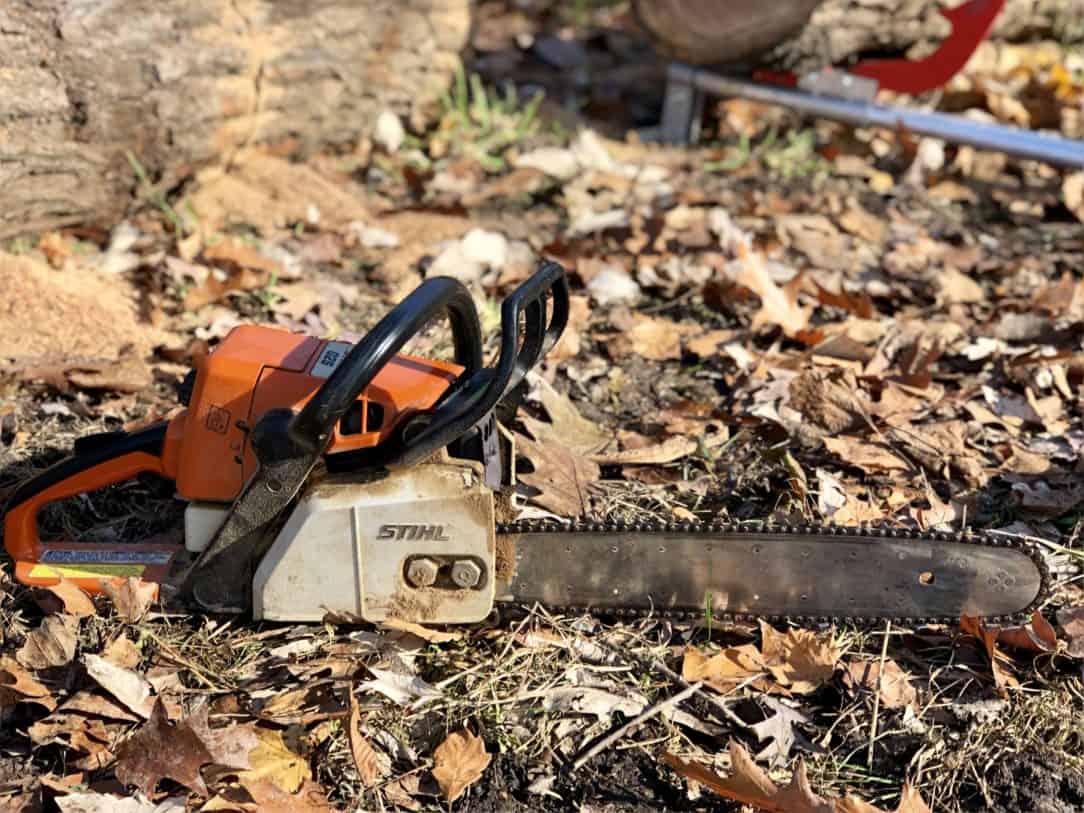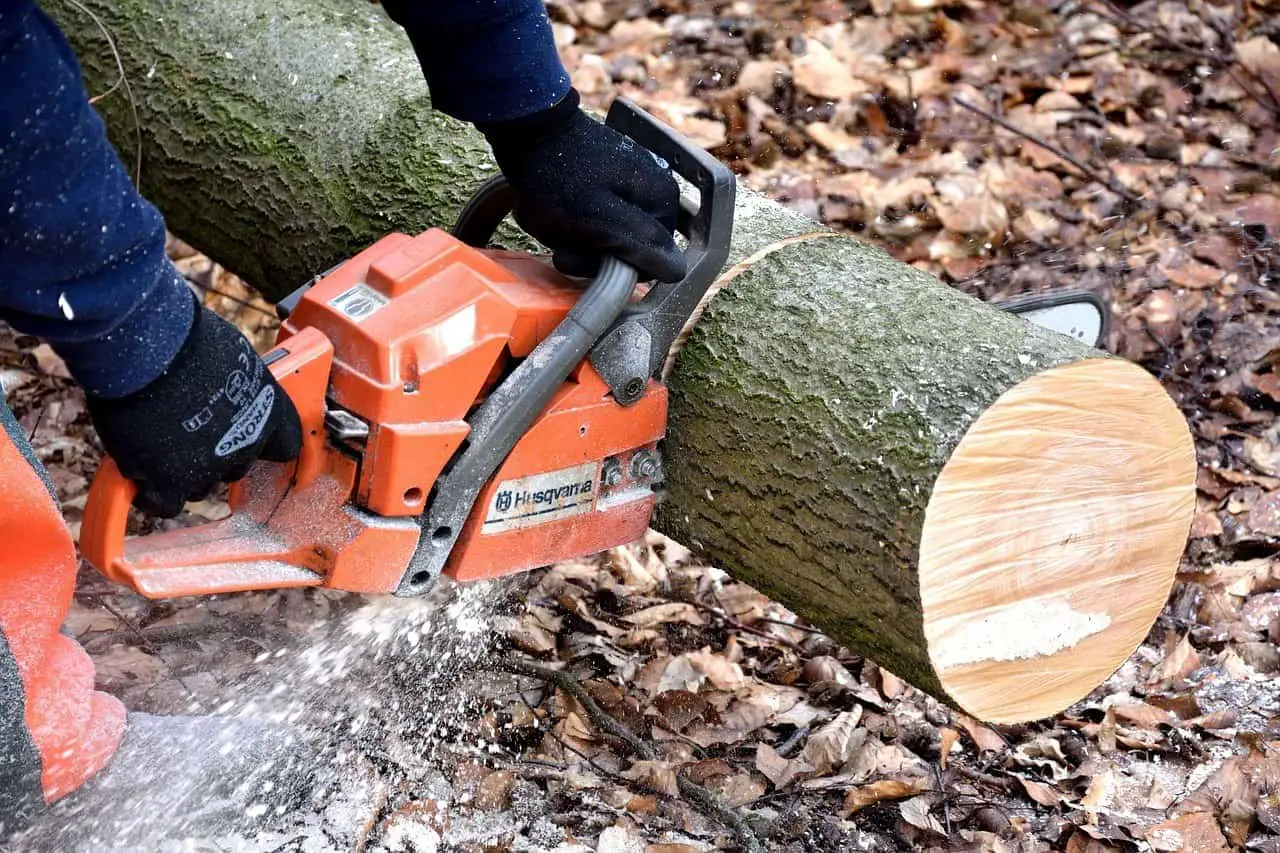
It’s a decades-old debate.
There’s no definitive “right answer”.
Yet, there’s still that burning question: which is better?
Stihl and Husqvarna (also called Husky) are the clear market leaders in the chainsaw world.
We’ve dug-deep, and have found an answer:
Well, it depends…
Gahhh!!?!
I know, it’s frustrating. But don’t lose hope.
Below, we’re gonna do three things:
- Give you our top pick
- Provide a quick comparison
- Highlight useful factors to consider
That way you can find exactly what you need.
If you just want an answer so you can move on with your life, you’ll find that below.
Or, if you want to learn some background info, and draw your own conclusions, you can do that too.
Let’s get to it!
How we compared
Nobody else matches Stihl and Husqvarna for quality, experience, and performance.
So the fact that you’re comparing the two, means you’re already in a great place. And at the end of the day, if you buy from either of these brands, you’re going to get a phenomenal machine.
This article is about which overall brand is better, but the best way to compare, is to use two specific chainsaws, one from Stihl and one from Husqvarna.
Here’s why: if we were to compare every model of Husqvarna with every model of Stihl, then each would win a few rounds. Part of the decision will also come down to your specific needs, including convenience, and personal preference. See more on that below.
So, in order to get specific, we’ve compared the Stihl MS 251 (Wood Boss) with the Husqvarna 445. These are both versatile chainsaws, and are competitors for the title of “best all-around chainsaw”.
Our #1 Pick
After comparing, Stihl is our #1 pick for best all-around chainsaw. Specifically the MS 251 (Wood Boss).
Stihl’s chainsaws aren’t sold online, and we’re not getting a commission for recommending them here. So you can be confident in our recommendation.
In addition, our family has been using Stihl chainsaws for 30 years. Just the other day, I was cutting up firewood with a 20 year-old version of the MS 251, and it still runs great!
You can see a side by side comparison of their technical specs below.
Quick Overview: Stihl vs. Husqvarna
Stihl MS 251 (Wood Boss)

This is our #1 most recommended chainsaw. It’s high-quality, well designed, and long-lasting. Great for a variety of jobs.
$329.99
Technical Specs:
- Displacement: 45.6 CC
- Horsepower: 3.0
- Torque: 2.5 NM
- Max. Bar Size: 18 inches
- Fuel Capacity: 13.2 OZ
- Base Weight: 10.8 Pounds
- Warranty: 1 year (consumer)
Performance vs. Husqvarna:
- Higher horsepower with less fuel
- Better torque helps on hardwoods
- Guide bar easier to maintain, and doesn’t require grease for nose
- Easier to access fuel/oil with custom cap design
Husqvarna 445

Like Stihl’s Wood Boss, this is a great chainsaw for homeowners, farmers and landowners. Great for a variety of jobs.
$339.99
Technical Specs:
- Displacement: 50.2 CC
- Horsepower: 2.8
- Torque: 2.4 NM
- Max. Bar Size: 20 inches
- Fuel Capacity: 15.2 OZ
- Base Weight: 10.8 Pounds
- Warranty: 2 years (consumer)
Performance vs. Stihl:
- Can handle a larger bar, allowing longer maximum cuts
- Cuts a little more smoothly
- Starts a little easier than Stihl
- Better designed cut-off switch (flips down, instead of up)
Factors to consider?
You’ve heard our top pick.
You’ve seen a side-by-side comparison.
But, you may have different needs for your chainsaw. Or you might already be considering a specific model.
We know that the 2 chainsaws above are not for everybody, so we also want to help equip you to make your own call.
That’s what we’ll do in this section. Here’s what we’ll cover:
- Your category
- Your personal preference
- Local chainsaw dealers
- Convenience
- In-person comparison
Start with your category
This is more of a general note, instead of a specific point of comparison.
When you’re in the market for a new chainsaw, it’s important to shop in the right category.
This just means you want to choose a chainsaw that is aligned with the frequency, and size of job you plan to tackle.
We split chainsaw users into roughly 3 categories:
- Homeowners
- Farmers and property owners
- Professionals
The majority of our readers fall into categories 1 and 2.
Once you understand your category, that should help you figure out what tier of Stihl or Husqvarna to go after.
Then, your next step is to compare those specific chainsaw models.
Personal Preference
All Stihl and Husqvarna chainsaws come with the same basic foundational features.
In addition, the design quality and performance of these two brands is so close, that it comes down primarily to personal preference.
If you want a lighter chainsaw
Stihl chainsaws tend to be a little lighter, partially because they have smaller fuel tanks.
Using the 2 chainsaws above as an example, they have the same base weight, but Stihl has a smaller tank.
That means when they’re filled with fuel, Stihl is going to be a bit lighter.
Plus, if you’re using the 20-inch bar on the Husqvarna 445, that will be a bit heavier than the Stihl with an 18-inch bar.
Mathematically these differences are pretty small, but they can have an impact on the feel of a chainsaw.
Depending on how you plan to use your chainsaw, this might help you make your decision between the two brands.
If you want the easiest start-up
Personally, I wouldn’t make my decision solely on this.
However, if you’re totally 50-50 between a Stihl and a Husqvarna, but you want something that starts really easily, then go for Husqvarna.
The Husqvarna start-up steps are a little different than Stihl’s, and tends to make it easier to get the saw running.
To be clear, it’s not hard to start a Stihl. They are still well-designed, and have a straight-forward start-up process. Husqvarna’s is just a tad better.
If you want the most torque
The cutting performance between the two saws is very close.
But Stihl saws tend to have a little more torque.
So if you’re primarily cutting through dense hardwoods, you might want to go with a Stihl.
This does vary by model, and you can look up the specific torque numbers if you like. But generally speaking, Stihl has a slight edge when it comes to torque.
If you want the best support
Go for a Husqvarna if you’re looking for the best support from the manufacturer.
Husqvarna provides a much longer warranty for their chainsaws compared to Stihl.
The majority of people never use product warranties, even when they are available. However, if you do value a good product warranty then Husqvarna will be a bit better for you.
They offer a 2-year warranty on their chainsaws, whereas Stihl only offers a 1-year warranty.
Local dealers
Outside of personal preference, another thing to consider is the presence of local dealers.
If you have a Stihl dealer near your home, but there’s no Husqvarna dealer around, then go for Stihl chainsaws.
This can be a huge decision maker, because you’ll want a place to buy the chainsaw, get it serviced, get replacement chains, etc.
All else equal, don’t be afraid to make your choice based on the closest (or friendliest) dealer.
How easy are they to buy?
This is related to the local dealers point above, but now we’re talking about the internet.
If you prefer to order a chainsaw, and have it delivered to your door, then you can’t buy a Stihl.
Sorry, it’s true. Stihl chainsaws are not sold online. Part of Stihl’s distribution and marketing strategy is to only sell their chainsaws through knowledgeable local dealers.
As a result, if you want to bypass the dealer and order directly online, then Husqvarna is your only option between the two.
In-person comparison > specs comparison
The ultimate approach for comparing two chainsaws, is to put them to the test!
No numbers on a fact-sheet, are a good substitute for real-world use. Avoid over-focusing on any one metric.
For example, if you’re only looking at a chainsaw’s displacement rating, then you’re missing a lot.
There’s plenty of knock-offs out there, that match Stihl and Husqvarna on paper, but can’t come close in real-world performance.
That’s why the best way to get a grasp of a chainsaw’s quality, is to test it outside on real jobs.
The Stoney Ridge Farmer did a great video of that exact process. If you watch the below video, you’ll see his real-world comparison. He’s using the Husqvarna 460 Rancher, and Stihl 311. These are larger chainsaws than what we compared above, but most of the features and comparison points he mentions are consistent between these models.
You might also notice, that he likes the Husqvarna better, whereas we usually use Stihl. This is a good example of how the biggest difference between these two brands is personal preference.
The history of Stihl vs Husqvarna
If you’re a history buff, or if you like the idea of a long-running rivalry, then this is the section for you.
Both Stihl and Husqvarna have been manufacturing chainsaws for over 50 years.
Both are headquartered in Europe. Stihl in Germany, and Huqvarna in Sweden.
And these two have long been the market leaders in chainsaw manufacturing.
Here’s a brief history of each:
Stihl: a brief history
Stihl was founded by Andreas Stihl, who invented the first chainsaw in 1926.
This first chainsaw was electric powered, bulky, and impractical at the time.
However, with better designs, more resources, and changing markets, Stihl’s chainsaw eventually evolved into an essential tool.
Over the years, Stihl has expanded their product line to include other tools, but their name and reputation is firmly-tied to their chainsaws.
Stihl continues to be the best selling chainsaw brand in the world.
Today, Stihl is still a privately held company, owned by the direct descendants of Andreas Stihl. The company has over 14,000 employees globally.
Husqvarna: a brief history
Husqvarna began as a state-owned manufacturing operation, which initially produced rifles in the late 1600s.
During the 1800s, Husqvarna shifted it’s product focus several times to adjust to changing markets and consumer demands.
They produced bicycles, sewing machines, and more, before finally landing on the product they are most known for: chainsaws.
In 1959, Husqvarna made their first chainsaw. By this time, Stihl was already in the market, but Husqvarna became their primary competitor.
For decades now, the performance of the two brands has been a popular topic of debate among loggers, firewood collectors, and home users.
Today Husqvarna is a publicly traded company, listed on the Stockholm stock exchange. They have over 13,000 employees globally.
Wrap-up
Whether you’re a long-time chainsaw owner, or a first time buyer, you’ll have encountered the Stihl vs. Husqvarna debate somewhere along the way.
In the above article, we gave you our top pick by comparing the Stihl MS 251 with the Husqvarna 445. Looking at specific chainsaws side-by-side is the best way to approach this age-old debate.
Sometimes Husqvarna is gonna win, other times Stihl will come out on top.
In the “factors to consider” section, we’ve highlighted some high-level comparison points, to help you direct your decision making.
At the end of the day, my personal preference is for Stihl. But if you’re leaning towards a Husqvarna, then you’ll still be getting a great machine.
If you’re looking for a other brands, check out our article on 18 of the best chainsaw brands.
Alright, that’s all from me, now go do something awesome!
References
https://www.stihlusa.com/products/chain-saws/homeowner-saws/ms251/
https://www.husqvarna.com/us/products/chainsaws/445/966955338/
https://stihl.partsmartweb.com/Catdata/EMP_IMG/STGSTH/Images/SERVICE/00601427.PDF
